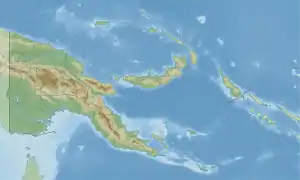Austrochaperina aquilonia
Austrochaperina aquilonia is a species of frogs in the family Microhylidae. It is endemic to the Sandaun Province, north-western Papua New Guinea. It is only known from two nearby locations in the Torricelli Mountains: Mount Somoro (type locality) and from the village of Wilbeite.[1][2][3] The specific name aquilonia is a Latin adjective meaning "northern" and refers to the range of this species in the north coast mountains of New Guinea.[2]

| Austrochaperina aquilonia | |
|---|---|
| Scientific classification | |
| Kingdom: | Animalia |
| Phylum: | Chordata |
| Class: | Amphibia |
| Order: | Anura |
| Family: | Microhylidae |
| Genus: | Austrochaperina |
| Species: | A. aquilonia |
| Binomial name | |
| Austrochaperina aquilonia | |
Description
Austrochaperina aquilonia is only known from two specimens, both adult males: the holotype (collected by Jared Diamond) measuring 31 mm (1.2 in) in snout–vent length, and the paratype (collected by Tim Flannery) measuring 23 mm (0.91 in). It is a relatively slender-bodied species with a bluntly pointed snout. The hands are relatively small and have small finger discs. The toes are unwebbed. The dorsum is pale graybrown with darker brown irregular spotting and mottling.[2]
Habitat and conservation
Habitat data are missing[2] but Austrochaperina aquilonia is believed to be a forest inhabitant. The specimens were collected somewhere between 730 and 1,420 m (2,400 and 4,660 ft) above sea level.[1] There are no known threats to this little known species.[1]
References
- IUCN SSC Amphibian Specialist Group & Allison, A (2020). "Austrochaperina aquilonia". IUCN Red List of Threatened Species. 2020: e.T57685A152548492.
- Zweifel, R. G. (2000). "Partition of the Australopapuan microhylid frog genus Sphenophryne with descriptions of new species". Bulletin of the American Museum of Natural History. 253: 1–130. doi:10.1206/0003-0090(2000)253<0001:POTAMF>2.0.CO;2. hdl:2246/1600.
- Frost, Darrel R. (2016). "Austrochaperina aquilonia Zweifel, 2000". Amphibian Species of the World: an Online Reference. Version 6.0. American Museum of Natural History. Retrieved 18 July 2016.
